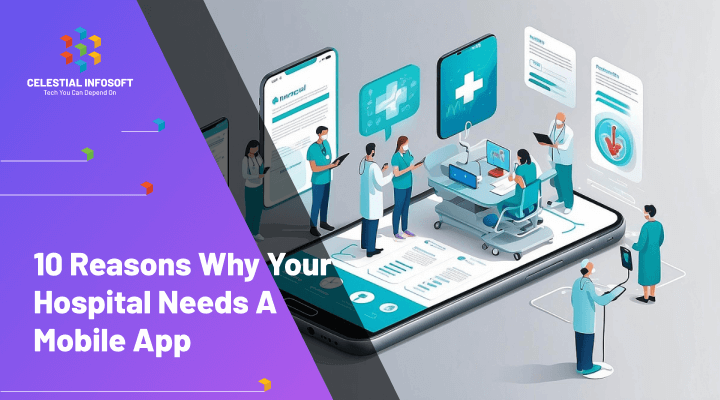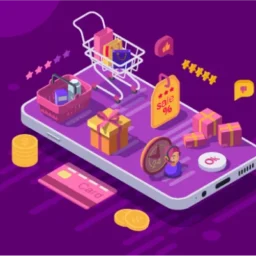Top 10 Best Reasons Why Your Hospital Needs a Mobile App

In today’s digital age, mobile apps and AI technology have changed almost every industry, including healthcare. Hospitals throughout the world are using mobile applications to streamline operations, improve patient care, and improve communication among healthcare providers. The benefits of AI in the healthcare industry have changed the world. In the modern day when accessibility and simplicity are important, a dedicated mobile app can be a game changer for hospitals looking to stay up-to-date and provide outstanding care for their patients.
Celestial Infosoft understands the importance of innovative healthcare solutions. Our “Uber for doctors” on-demand app and custom software development services are designed to meet the changing needs of hospitals. Here are ten reasons Your Hospital Needs a Mobile App and how it could change the way you provide healthcare.
The main reasons why your hospital needs a mobile app for convenience
1. Better patient engagement:
A mobile app can greatly increase patient engagement by offering customized services. The app lets patients see their health records, receive appointment reminders, and talk directly with healthcare experts. This improved communication allows patients to feel more involved in their healthcare journey, resulting in a greater commitment to treatments and an increased commitment to their health.
Hospitals can help patients make sensible choices by providing educational content on popular health concerns and preventive measures. An app can help collect information from patients through surveys and feedback forms, boosting the quality of care and overall patient happiness.
2. Easy Appointment Scheduling:
Managing appointments is an important part of a hospital’s operation. A smartphone app can help you schedule and manage appointments better. Patients may plan, reschedule, and cancel appointments with a few taps on their smartphones. This is one of the reasons your hospital requires a mobile application. This reduces the load of long phone hold times and reduces no-shows by sending automated reminders.
Furthermore, the app allows users to select their favorite doctor or department based on availability and urgency, resulting in a more efficient and personalized healthcare experience.
3. Efficient billing and payment:
Billing processes can be complex and time-consuming. A mobile app can make this easier by offering a secure platform for patients to check bills, file insurance claims, and make payments. With a simple interface, patients can simply track their outstanding amounts, understand their payment alternatives, and execute transactions.
This not only improves billing transparency but also reduces the administrative stress on hospital staff, freeing up important assets for patient care.
4. Instant Availability of Medical Records:
The traditional way of accessing medical records via paperwork or phone calls can be inconvenient for both patients and healthcare providers. A smartphone app offers a single platform for patients to access their medical history, test results, and treatment plans. This real-time access allows people to make more educated decisions and understand their health state.
Doctors can also profit from this by studying a patient’s history before consultations, resulting in faster evaluations and more accurate treatments.
5. On-demand Doctor Services:
Access to quick medical advice matters most in emergency and routine check-ups. Our Uber for Doctors on-demand app links patients with healthcare specialists for consultations via chat or video call. This avoids unnecessary hospital visits and makes quality treatment available from the convenience of one’s own home.
Hospitals can use this tool to provide after-hours care or specialized telemedicine services, guaranteeing that no patients go ignored during off-peak hours. This is the main reason why your hospital needs a mobile app.
6. Remote patient monitoring:
Remote monitoring can greatly improve results for people with ongoing medical conditions or those recovering from surgery. A mobile app can communicate with wearable devices to collect and send patient data, such as heart rate, blood pressure, and glucose levels, to healthcare specialists.
This enables doctors to monitor patients’ health in real-time, allowing for immediate action when needed. It also gives patients peace of mind by ensuring that their status is closely monitored without requiring frequent hospital visits.
7. Better Internal Communications:
Effective communication among healthcare providers is important for providing timely and correct patient care. A hospital mobile app can contain encrypted messaging services that allow doctors, nurses, and administrative personnel to communicate essential updates and patient information.
This reduces the possibility of confusion, speeds up decision-making, and encourages better teamwork among departments. This is the biggest reason why your hospital requires a mobile application. Furthermore, the app may be used to distribute hospital-wide announcements, updates on new protocols, and training materials, ensuring that everyone is aware.
8. Streamlined Administrative Methods:
Administrative efficiency plays an important role in healthcare. A mobile app can automate several administrative duties, including patient registration, permission forms, and surveys. This minimizes paperwork and enables administrative personnel to focus on more important activities.
Furthermore, the app can connect with existing hospital administration systems to provide seamless data synchronization and ensure that all departments have access to current information.
9. Improved Patient Loyalty:
In an era when patients have multiple healthcare options, loyalty can make a big impact. Hospitals may improve their patient relationships by delivering a handy, user-friendly mobile app. This is the key reason why your hospital mandates a smartphone app. Features such as customized health suggestions, prizes for regular check-ups, and quick access to healthcare services can develop loyalty and encourage patients to return to the same hospital for future care.
Furthermore, a positive app experience could lead to word-of-mouth referrals, increasing the hospital’s patient base and reputation.
10. Data-driven decision-making:
Mobile apps can provide significant information about patient behavior, preferences, and health trends. Hospitals can use this data to get insights into areas for improvement, discover popular health concerns among patients, and fine-tune their service offerings.
This data-driven strategy enables hospitals to modify their plans, improve patient outcomes, and make more informed decisions about resource allocation and service expansion.
Conclusion:
In the constantly evolving healthcare scene, mobile applications have become essential tools for hospitals. They streamline the involvement of patients, improve internal communication, and improve care quality. Celestial Infosoft specializes in developing personalized healthcare solutions, such as our Uber for Doctors on-demand app and other custom software applications.
A mobile app will assist your hospital provide great patient care, build loyalty, and maintain a competitive advantage in the business. Investing in one today is not just an option; it is a requirement to meet the changing needs of modern healthcare customers.
